– An exhibition where you can see the latest technological trends in Japan moving towards a 'hydrogen society', visited by 2.5 people over two days –
– Introduced a value chain that produces hydrogen on-site where it is needed and uses it to be recharged at a hydrogen station –
'FC Expo 2021', Japan's leading exhibition specializing in hydrogen and fuel cells, was held from September 9th to October 29st at Aomi Exhibition Center, Tokyo Big Sight, Japan. Japan is actively investing in related technologies and infrastructure with the goal of realizing a 'hydrogen society' by 1. In this exhibition, 2050 related companies exhibited the latest trends that will lead the 'hydrogen society', such as small hydrogen manufacturing facilities that produce hydrogen on-site where hydrogen is needed, and hydrogen stations that can be recharged by themselves. The Korean pavilion supported by KOTRA drew attention. Hydrogen vehicle and electric vehicle parts producers, as well as research institutes with innovative hydrogen-related technologies, participated, and 50 business consultations were held over two days, with inquiries from Japanese companies wishing to cooperate with Korean companies.
Entrance to the 'Smart Energy Week 2021' exhibition hall
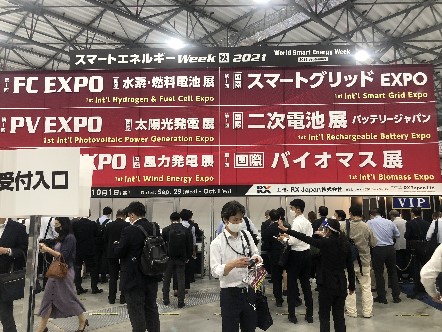
Exhibition overview
'FC Expo 2021' is a part of 'World Smart Energy Week 2021', the largest green energy exhibition in Japan, and is held twice a year in spring and fall. This exhibition attracted 2021 visitors.
Organized the 'World Smart Energy Week 2021' exhibition
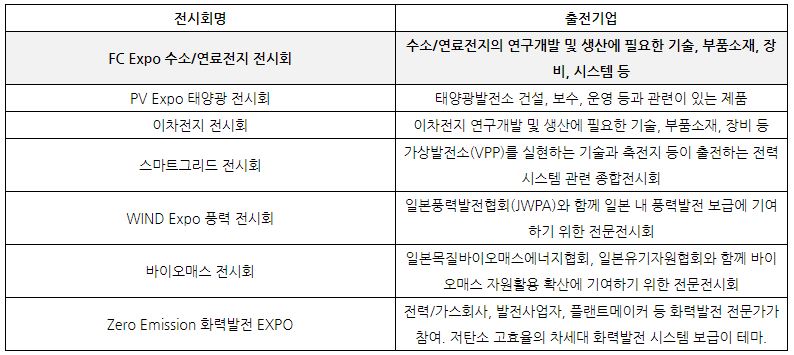
'FC Expo 2021' Exhibition Overview

Information on major exhibition areas and booths
In the 'FC Expo 2021' exhibition, companies dealing with hydrogen and fuel cell-related parts and materials, manufacturing technology, hydrogen production and storage supply related products and technologies, fuel cell systems and products, and evaluation, measurement, analysis and inspection products were exhibited.
Products eligible for exhibition at 'FC Expo 2021'
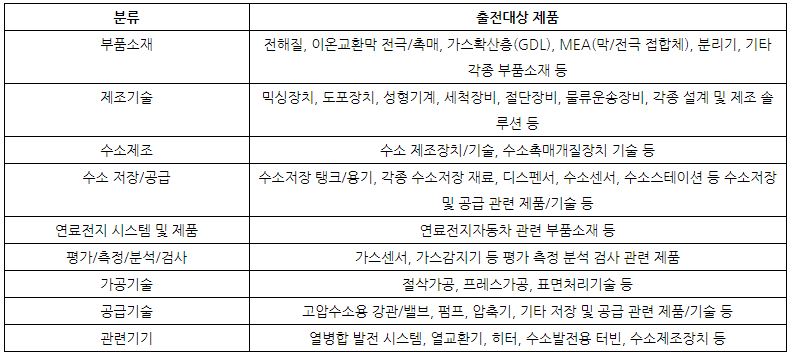
Among them, a booth dealing with products and technologies related to hydrogen stations stood out. As of August 2021, there are 8 hydrogen stations operating in Japan, distributed across the country, including 155 in Tokyo and 22 in Osaka.
TATSUNO, a manufacturer of high-pressure hydrogen gas dispenser used for hydrogen energy charging of fuel cell vehicles (FCV), introduced a hydrogen gas self-charging dispenser at the exhibition. The driver can set the desired amount of charge and press the button to start charging. If self-charging is commercialized, it is possible to reduce the number of permanent residents of the hydrogen station, which is expected to reduce labor costs.
Exhibition booth view (TATSUNO)
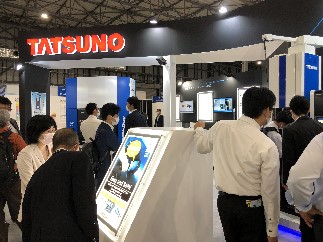
Sample of TATSUNO's hydrogen gas self-filling dispenser
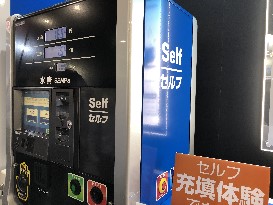
Mitsubishi Chemical introduced 'HyGeia Series', an on-site small hydrogen production facility that can manufacture/supply high-purity hydrogen gas. It can be used in manufacturing sites such as semiconductors, optical fibers, and quartz glass, and can be installed in hydrogen stations as well. The 'HyGeia series' is being used in 6 hydrogen stations at home and abroad, including the Haneda hydrogen station in Ota-ku, Tokyo.
In particular, the Haneda Hydrogen Station drew attention by applying a technology that separates and recovers only carbon dioxide (CO2) from impurities generated from hydrogen production equipment. The recovered carbon dioxide is liquefied by pressurization and cooling. It is expected to be able to minimize the carbon emission that may occur during the hydrogen production process.
Mitsubishi Chemical Panel Exhibition (Case of carbon dioxide recovery in Haneda Hydrogen Station)
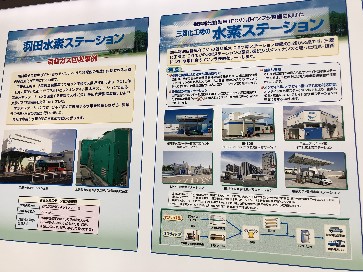
Introduction to the Korean Pavilion at 'FC Expo 2021'
KOTRA operated the Korean Pavilion within the 'FC Expo 2021' to help Korean innovative innovative technology companies preoccupy the Japanese market. Six Korean companies participated and exhibited their products and technologies, and participated in online consultations remotely in Korea. The Korean Pavilion Linkage Project was also promoted. It is a 'Smart Energy Partnering in Japan' project, which includes technical pitching briefing sessions and online and offline consultations. Small and medium-sized enterprises in Korea are in high demand for technological cooperation with Japanese companies, including companies participating in the Korean pavilion, in the fields of hydrogen energy, hydrogen mobility and secondary batteries. 6 companies participated and conducted 35 export and technical cooperation consultations with 80 Japanese buyers.
Panoramic view of 'FC Expo 2021' Korean Pavilion
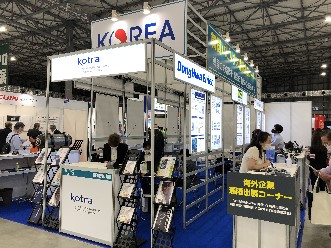
On-site interview (3 companies participating in the Korean Pavilion)
All of the companies participating in the Korean Pavilion, except for one that had consultations with Japanese partners, conducted video consultations with visitors in real time. It was regrettable that he could not visit the exhibition in person due to Corona 1, but he expressed his gratitude for being able to participate remotely with the support of KOTRA. During the three-day exhibition period, our company conducted more than 19 consultations in total. Among them, we listened to the voices of the field from companies that achieved tangible results.
(CEO Dal-Young Park, Dong-A Fuel Cell) Dong-A Fuel Cell is a manufacturer of high-temperature polymer fuel cells. CEO Park Dal-young said, “In the fuel cell industry, large corporations such as Toshiba and Panasonic occupy a high market share in the Japanese market based on advanced technology. said. “Some companies have asked if it is possible to supply the core components that make up the system, such as the stack, in an improved version tailored to Japanese consumers,” he said. Also, “There was a risk of technology leakage if we discussed our innovative technology in an open place. The concern has been resolved by allowing KOTRA to have an hour-by-hour video meeting with potential buyers in an individual meeting room quietly.
(Hydrolux, Director Kim Kyung-hoon) Hydrolux is a company with high-capacity hydrogen storage alloy production technology. Director Kim Kyung-hoon said that he received a lot of love calls from Japanese conglomerates through this exhibition. A machine tool maker in Aichi Prefecture, Company B, asked if it could respond to everything from hydrogen storage alloy materials to hydrogen storage container finished products. Director Kim Kyung-hoon said, “I am happy to introduce our products to the Japanese market. It was new to experience a non-face-to-face exhibition for the first time in the era of the COVID-19 pandemic. It was a good opportunity in terms of time and cost,” he said.
(Inji Controls, Deputy Manager Chae Se-wook) Inji Controls, a hydrogen car and electric vehicle parts producer, introduced various products from temperature control modules to cooling water pumps at this exhibition. Deputy Manager Chae Se-wook said, “The eco-friendly energy industry is an industry in the growth stage. Through this exhibition, it was a great help in securing contact information for industry officials and understanding market trends. .
Remote video consultation scene of participating companies in the Korean Pavilion (Dong-A Fuel Cell)
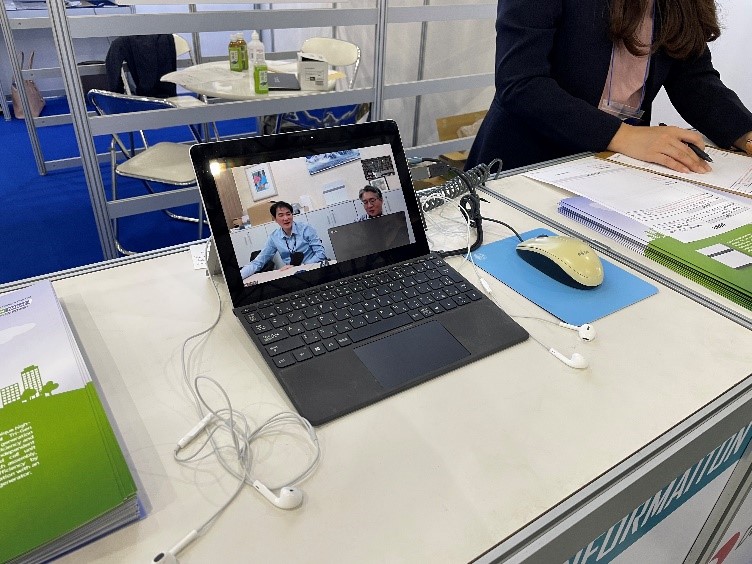
Remote video consultation scene of participating companies in the Korean Pavilion (Cognitive Controls)
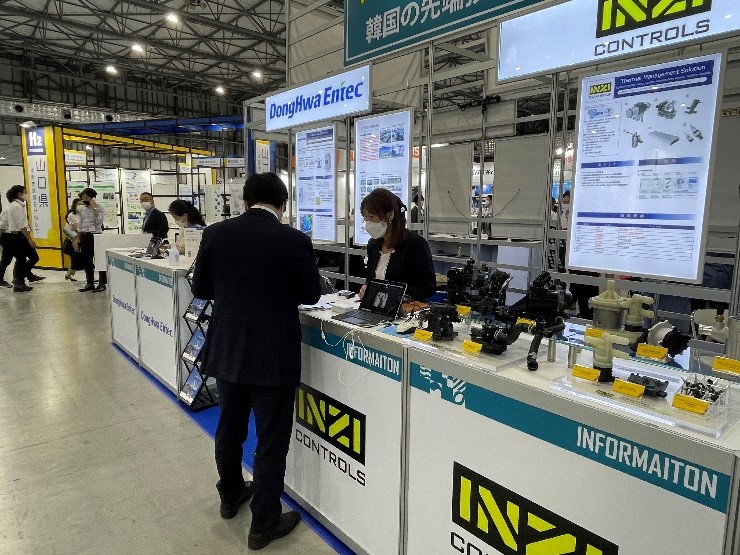
implication
In October of last year, the Japanese government announced a plan to reduce greenhouse gas emissions by 2050% compared to 2013 and achieve carbon neutrality in 2030 areas* by 46 through the '2050 Carbon Neutral Declaration' last October. As the Japanese government spurs technological support in each field, investment in new and renewable energy, including hydrogen energy, is expected to steadily increase in the future.
* 14 fields: offshore wind power, hydrogen ammonia, next-generation thermal energy industry, nuclear power (SMR/hydrogen manufacturing field), ships, automobiles/secondary batteries, semiconductors/information and communications, logistics/civil infrastructure, food and beverage/agricultural and fishery industries, aircraft, CO2 regeneration , residential building/next-generation power management, resource circulation, lifestyle (decarbonization business), etc.
In particular, in the mobility sector, the demand for the development of next-generation eco-friendly vehicles is expected to increase as regulations on the production and import of internal combustion engine vehicles are strengthened in developed countries such as Europe and North America, which are the largest sales countries of Japan's major automobile manufacturers. Toyota also announced a mid- to long-term plan to sell more than 2030 million eco-friendly mobility such as EVs, FCVs, and PHVs worldwide by 550.
KOTRA is also continuously supporting companies in the field of renewable energy and eco-friendly mobility to advance into Japan. Through this exhibition and partnering event, we plan to support matching with Japanese buyers, and promote joint technology development projects with relevant organizations for promising consultations to achieve long-term advancement into the Japanese hydrogen market. In addition, companies that need office space in Japan can utilize support projects such as moving into a GP center located in Nagoya. It is time for Korean companies to pay attention to the next-generation promising fields such as renewable energy and eco-friendly mobility.
Source: Comprehensive data from the exhibition website, Japan Fuel Cell Commercialization Promotion Council, TATSUNO, Mitsubishi Chemical, and KOTRA Tokyo Trade Center



